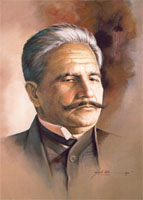Allama Iqbal Biography
BirthIqbal was born in the Punjab on February 22, 1873. His ancestors, who were Kashmiri Brahmins, had embraced Islam two hundred years earlier. Iqbal’s own father was a devout Muslim with Sufistic bent of mind.
Primary Education
He received his early education in Sialkot. After passing the entrance examination, he joined Intermediary College. Mir Hassan, a great oriental scholar, had a special aptitude for imparting his own literary taste and to his students. Under his influence, Iqbal was drawn towards Islamic studies, which he regarded to be an outstanding favor that he could not forget it all his life.
Higher Education
Passing on to the Government College of Lahore, Iqbal did his graduation with English Literature, Philosophy and Arabic as his subjects. At the college he met Prof. Arnold and Sir Abdul Qadir. Iqbal’s poem, Chand (moon) and other early poems appeared in the journal (which belonged to Sir Abdul Qadir) in 1901 and were acclaimed by critics as cutting a new path in Urdu poetry.
It did not take him long to win recognition as a rising star on the firmament of Urdu literature.
In the mean time he had done his MA in Philosophy and was appointed as a Lecturer in History, Philosophy and Political science at Oriental College, Lahore. He then moved to Government College to teach Philosophy and English Literature.
Wherever Iqbal worked or thought his versatility and scholarship made a deep impression on those around him.
In Europe
Iqbal proceeded to Europe for higher studies in 1905 and stayed there for three years. He took the Honors Degree in Philosophy and taught Arabic at the Cambridge University in the absence of Prof. Arnold. From England, he went to Germany to do his doctorate in Philosophy from Munich and then returned to London to qualify for the bar. He also served as a teacher in the London school of Commerce and passed the Honors Examination in Economics and Political Science. During his stay in Europe Iqbal not only read voraciously but also wrote and lectured on Islamic subjects which added to his popularity and fame in literary circles.
Back in India
Iqbal returned to India in 1908. The poet had won all these academic laurels by the time he was 32 or 33. He practiced as a lawyer from 1908 to 1934, when ill health compelled him to give up his practice. In fact, his heart was not in it and he devoted more time to philosophy and literature than to legal profession.
He attended the meetings of Anjuman Himayat-I-Islam regularly at Lahore. The epoch making poems, Shikwa and Jawab-e-Shikwa, which he read out in the annual convention of it one year after another, sparkled with the glow of his genius and made him immensely popular. They became the national songs of Millet.
Iqbal’s other poems Tarana-e-Hind (The Indian anthem) and Tarana-e-Milli (the Muslim Anthem) also became very popular among masses and used to be sung as symbols of National or Muslim identity at public meetings.
The turning point in Iqbal’s Life
Iqbal was shaken by the tragic events of World War I and the disaster the Muslims had to face. The genius had passed through the formative period. He had attained maturity as a poet, thinker, seer and crusader who could read the signs of tomorrow in the happenings of today, make predictions, present hard facts and unravel abstruse truths through the medium of poetry and ignite the flame of faith, Selfhood and courage by his own intensity of feeling and force of expression. Khizr-e-Raah (The Guide) occupies the place of pride among the poems he wrote during this period. Bang-e-Dara (The caravan bell) published in 1929 has held a place of honor in Urdu poetry and world poetry.
Iqbal preferred Persian for poetic expression because its circle was wider than that of Urdu in Muslim India. His Persian works, Asrar-e-khudi (Secrets of the self), Rumuz-e-Bekhudi (Mysteries of Selflessness), Payam-e-Mashriq (Message of the East), Javed Nama (The Song of Eternity) belong to the same period of his life. And so is Reconstruction of Religious Thoughts in Islam, which was extensively appreciated and translated into many languages. Academies were set up in Italy and Germany for the study of Iqbal’s poetry and philosophy.
Politics
In 1927 the poet was elected to the Punjab Legislative assembly. In 1930, he was elected to preside over at the annual session of Muslim League. In his presidential address at Allahabad, Iqbal for the first time introduced the idea of Pakistan. In 1930-31, he attended the Round Table conference, which met in London to frame a constitution for India.
Allama Iqbal
Allama Iqbal
Allama Iqbal
Allama Iqbal
Allama Iqbal
Allama Iqbal
Allama Iqbal
Allama Iqbal
Allama Iqbal
ALLAMA IQBAL aur khudi (Awaz-e-Shayeq)
Iqbal Tere Des Ka Kya Haal Sunaon
Iqbal Tere Des Ka Kya Haal Sunaon








No comments:
Post a Comment